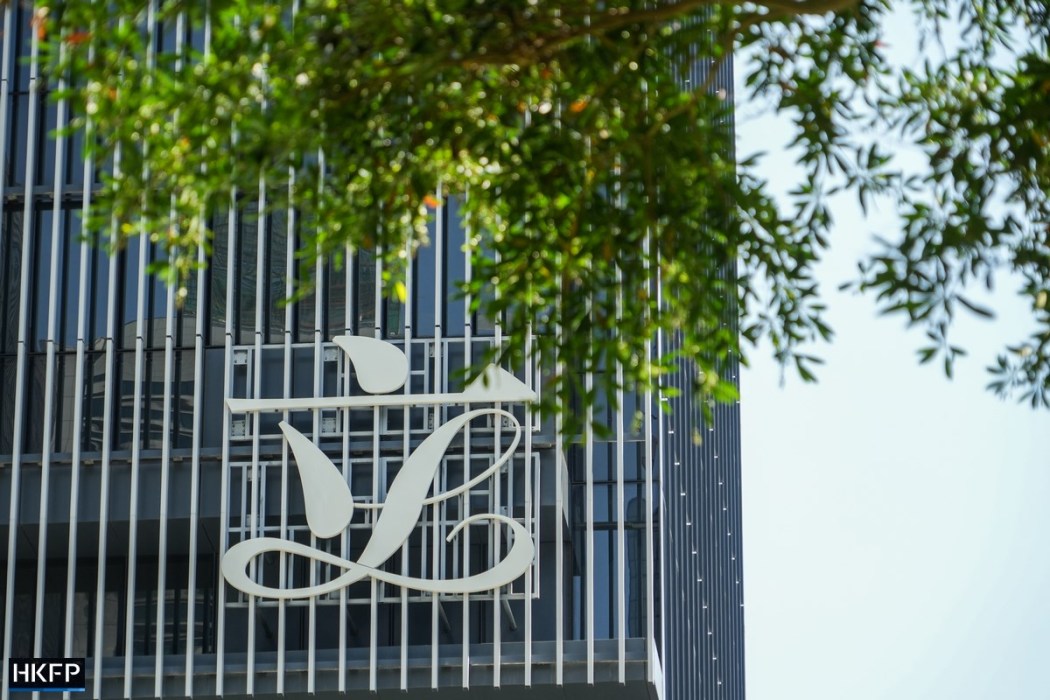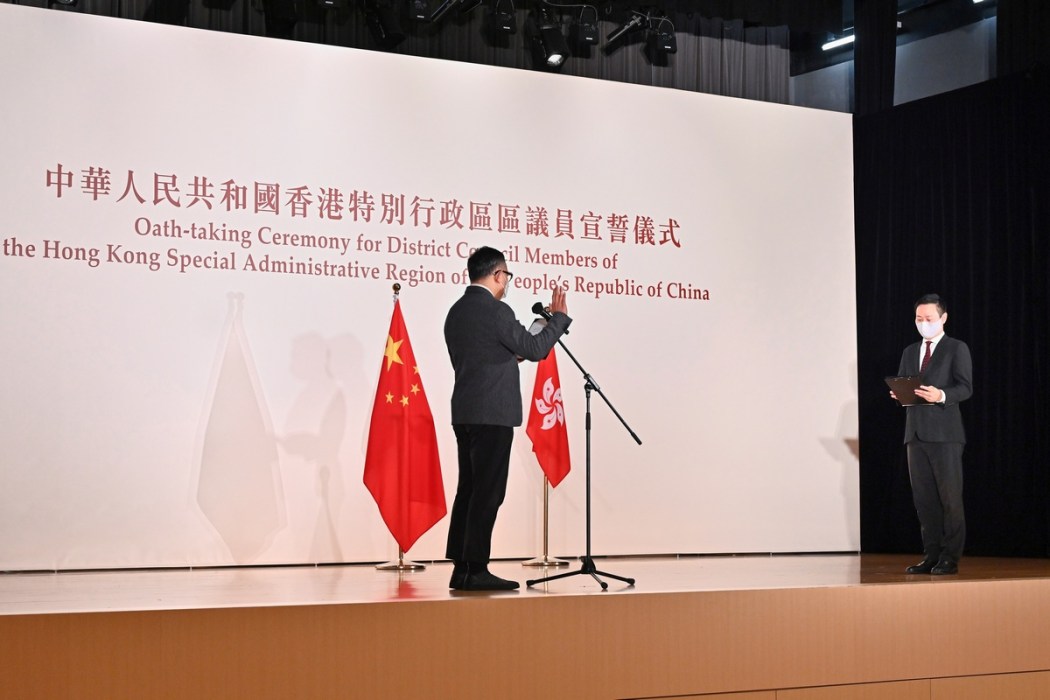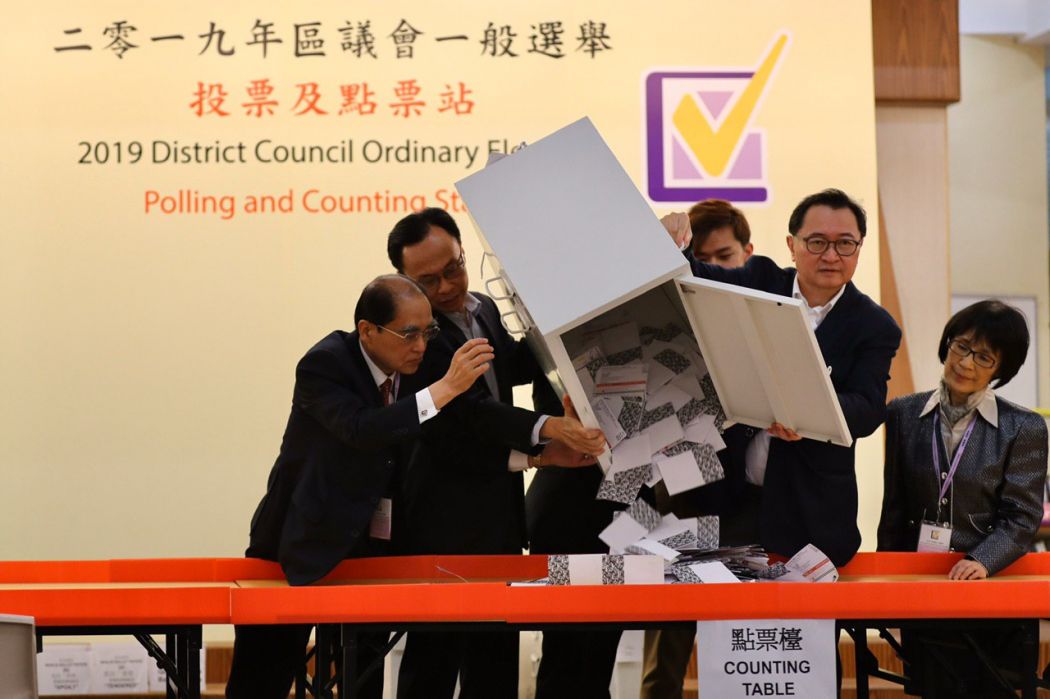The Hong Kong government has officially tabled a bill for overhauling the District Council, as an official accused former councillors of “swindling” votes in the 2019 election by inciting hatred towards the government amid the anti-extradition bill unrest.

The District Council (Amendment) Bill 2023 was gazetted on Tuesday and introduced to the Legislative Council for its first and second reading on Wednesday. It came a little over two weeks after the government concluded a 14-day public consultation for the overhaul which was first announced in early May.
Secretary for Constitutional and Mainland Affairs Erick Tsang told lawmakers on Wednesday that it was necessary for the government to improve district-level administration and ensure the advisory body was “firmly in the hands of the patriots.”
The minister claimed that at the peak of the 2019 extradition bill protests, “anti-China and Hong Kong elements” took advantage of “loopholes” in the District Council election system to “swindle” votes by politicising various issues and provoking hatred towards the government.
“A lot of these so-called district councillors… insulted the Hong Kong government officials, disrupted governance, incited conflicts, divided society, created confrontation, disregarded the needs of the people, damaged district development and harmed the well-being of the people and Hong Kong,” the official said when he introduced the bill to the legislature.

These councillors “seriously deviated” from the “non-political” role of the District Council and committed acts endangering national security, Tsang alleged. In the November 2019 election, the pro-democracy camp won a landslide victory.
Then-chief executive Carrie Lam said at the time that the government respected the 2019 election results. She acknowledged there were various analyses and interpretations of the results, saying some were of the view that the outcome showed people’s disaffection with the current situation and deep-rooted issues in society.
“The HKSAR Government will listen to the opinions of members of the public humbly and seriously reflect,” she said.
Some district councillors stepped down after the government demanded public officers to take an oath of allegiance because of their “guilty conscience,” Tsang said, while some were disqualified over “invalid” oaths.

According to the minister, the incumbent district councils became “incomplete” with only 146 councillors left, less than one third of the original 479 representatives. The government therefore had a responsibility to improve the future District Council, including its functions, composition and election methods, to ensure it would perform its duties, he said.
Tsang called on legislators to back the bill and the government’s work in improving district administration work. He also cited more than 1.6 million signatures collected by pro-establishment organisations in support of the overhaul.
“Today, I stand in the chamber not only to submit a draft bill on behalf of the SAR government, but also to carry the strong aspirations and expectations of all citizens for a better life and harmonious community,” Tsang said.
“The government hopes to work together with the Legislative Council to review the draft bill, so that the new District Council, which is comprehensive, colourful, and attracts talents, can take office as scheduled on January 1st next year,” he added.
Directly elected seats slashed
The legislative amendment is set to transform district-level politics and the election expected to be held in November. According to the proposal, only 88 out of 470 seats would come from direct election. The last district council poll in 2019 produced 452 directly elected seats out of 479.
Under the overhaul, the remaining 179 seats would be appointed by the chief executive, while 176 seats would be returned through indirect elections. Elections would be held within three government-appointed committees, including the District Fight Crime Committees, District Fire Safety Committees and Area Committees of each district.
The three committees would gain power under the new election system to nominate candidates for District Council elections. A candidate must secure at least three nominations from each committee before they throw their hat in the ring.
A new vetting committee – the District Council Eligibility Review Committee – will also be set up to conduct background checks on the candidates to ensure they are patriotic. The revamped election would see redrawn boundaries, reducing the total number of constituencies from 452 to 44. Each constituency will return two representatives.
The proposed ratio of directly elected seats marked a “regression” in the city’s electoral system and would make it more difficult for public opinion to reach the authorities, local elections scholar Ma Ngok told Ming Pao in early May.

Paul Zimmerman, the vice-chairperson of the Southern District Council and a veteran Hong Kong District Councillor said he would not run for the next term as the reform would “destroy the final bastion of democracy” in the city and result in “a loss for everyone.”
Tsang said on Wednesday that he and his team attended media interviews and more than a hundred sharing sessions over the past month to explain the overhaul to the public and listen to their views.
Earlier this month, the Democratic Party criticised the consultation period for being shorter than for other major policies, which usually lasts for three months.
” [The proposed bill] largely changed the function and composition of the District Council. The public need time to understand and digest before discussions and two weeks are simply not enough, ” party said in a statement on May 16.
Support HKFP | Policies & Ethics | Error/typo? | Contact Us | Newsletter | Transparency & Annual Report | Apps
Help safeguard press freedom & keep HKFP free for all readers by supporting our team

LATEST FROM HKFP
HKFP has an impartial stance, transparent funding, and balanced coverage guided by an Ethics Code and Corrections Policy.
Support press freedom & help us surpass 1,000 monthly Patrons: 100% independent, governed by an ethics code & not-for-profit.










